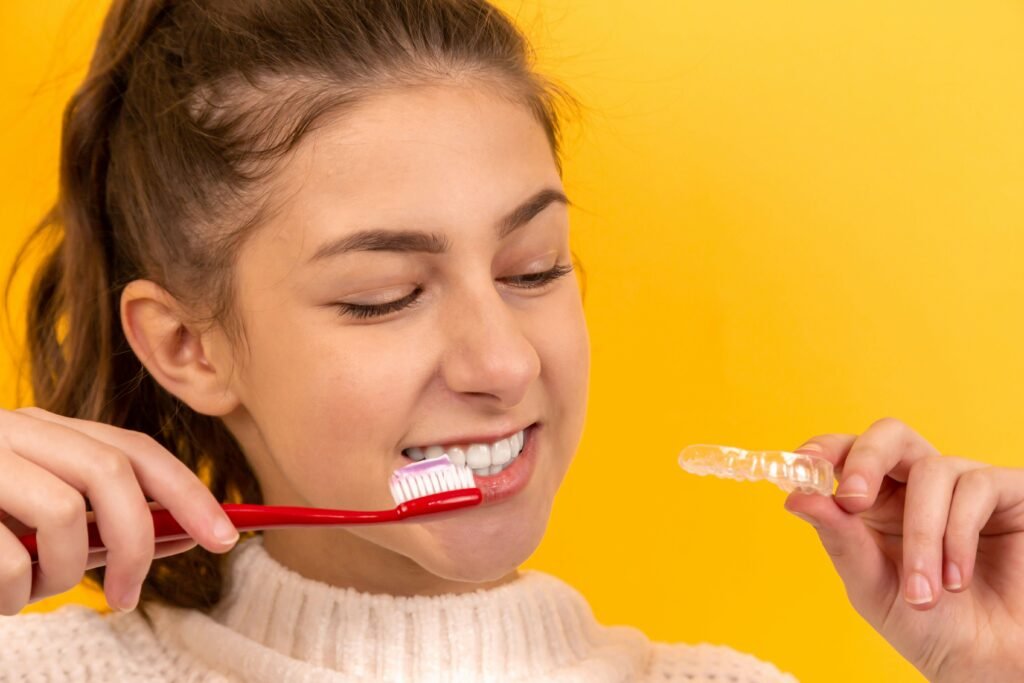Maintaining healthy gums is crucial for overall oral health, as they serve as the foundation for strong and vibrant teeth. In this article, we will explore some effective strategies that you can easily incorporate into your daily routine to promote healthy gums. From proper brushing and flossing techniques to incorporating a balanced diet and regular visits to the dentist, you’ll discover practical tips that will help you achieve and maintain a healthy and beautiful smile. So, let’s dive into these gum health strategies and take a step towards a happier, healthier mouth!

This image is property of images.unsplash.com.
Maintain a Regular Oral Hygiene Routine
Taking care of your gums starts with establishing a regular oral hygiene routine. By following these simple steps, you can keep your gums healthy and prevent gum disease.
Brush your teeth twice a day
Brushing your teeth twice a day is a fundamental part of maintaining good oral health. Make sure to brush in the morning and before bed to remove plaque and food particles that can cause gum inflammation. Use a soft-bristled toothbrush and a toothpaste with fluoride for optimal results.
Floss daily
Brushing alone is not enough to clean all surfaces of your teeth and gums. Flossing helps remove plaque and debris from between your teeth and along the gumline. Take a piece of floss about 18 inches long and slide it gently between your teeth, making a C-shape around each tooth. Be careful not to snap the floss into your gums, as this can cause irritation.
Use mouthwash
Mouthwash can be a valuable addition to your oral hygiene routine. An antibacterial mouthwash can help kill bacteria that cause gum disease and freshen your breath. After brushing and flossing, swish a small amount of mouthwash in your mouth for the recommended duration, usually around 30 seconds. Avoid mouthwash with alcohol, as it can dry out your mouth.
Clean your tongue
Cleaning your tongue is an often overlooked but important step in maintaining good gum health. Bacteria can accumulate on the surface of your tongue, leading to bad breath and gum problems. Use a tongue scraper or your toothbrush to gently clean your tongue from back to front. This helps remove bacteria and improve your overall oral hygiene.
Visit your dentist regularly
Regular dental check-ups are crucial for maintaining gum health. Your dentist can identify early signs of gum disease and provide appropriate treatment. Additionally, professional dental cleanings can remove plaque and tartar buildup, which cannot be effectively removed at home. Aim to visit your dentist at least twice a year, or as recommended by your dental professional.
Choose the Right Toothbrush and Toothpaste
Selecting the right toothbrush and toothpaste can significantly impact your gum health. Here are a few tips to guide you in making the right choices.
Opt for a soft-bristled toothbrush
Using a toothbrush with soft bristles is essential to avoid damaging your gums. Medium or hard-bristled brushes can be too abrasive and cause gum recession or irritation. Soft bristles are gentle on your gums and still effectively clean your teeth.
Use toothpaste with fluoride
Fluoride is a mineral that helps strengthen tooth enamel and prevent tooth decay. Look for toothpaste that contains fluoride to ensure you are providing your teeth and gums with the necessary protection. Fluoride toothpaste has been proven to promote better gum health and prevent gum disease.
Consider an electric toothbrush
Electric toothbrushes can offer several advantages for gum health. Their rotating or oscillating heads can remove plaque more effectively than manual brushing, reducing the risk of gum disease. Electric toothbrushes also tend to have built-in timers, ensuring you brush for the recommended duration of two minutes.
Replace your toothbrush regularly
Toothbrushes wear out over time, and bristles can become frayed and ineffective at cleaning your teeth and gums. It is recommended to replace your toothbrush every three to four months, or sooner if bristles become worn. Using a worn-out toothbrush can result in inadequate cleaning and may contribute to gum problems.
Proper Brushing Technique
Knowing how to brush your teeth properly is crucial for maintaining healthy gums. Follow these steps to ensure you are brushing effectively.
Hold your brush at a 45-degree angle
Position your toothbrush at a 45-degree angle towards the gumline. This allows the bristles to reach beneath the gumline and remove plaque effectively. Apply gentle pressure to avoid irritating your gums.
Brush using gentle, circular motions
Instead of scrubbing back and forth, use small circular motions to clean the surfaces of your teeth and gums. This technique helps remove plaque and debris more thoroughly without causing damage to your gums.
Pay attention to each tooth surface
Make sure to brush all surfaces of your teeth – front, back, and chewing surfaces. Spend equal time on each section to ensure a comprehensive clean. Don’t forget to brush along your gumline, where plaque tends to accumulate.
Brush for at least two minutes
It is essential to brush for a minimum of two minutes to allow enough time to clean your entire mouth thoroughly. Use a timer or play a song to make sure you are brushing for the recommended duration.
Don’t forget to brush your gums
Gently brush your gums along the gumline to remove plaque and stimulate blood circulation. Healthy gums are essential for overall oral health, so taking the time to brush them is crucial.
Importance of Flossing
Flossing plays a vital role in maintaining gum health. It helps reach areas that a toothbrush cannot access and removes plaque and food debris that can lead to gum disease.
Choose the right flossing technique
To floss effectively, take about 18 inches of floss and wrap most of it around your middle fingers, leaving a short section to work with. Hold the floss tightly between your thumbs and index fingers, and gently insert it between your teeth using a back-and-forth motion.
Use enough floss for each tooth
Be sure to use a clean section of floss for each tooth to avoid transferring bacteria. Gently guide the floss up and down against the side of each tooth, making a C-shape to follow the natural curve of the tooth.
Floss between each tooth
Do not skip any teeth when flossing. Take the time to floss between each tooth, including the back teeth. Plaque and food particles can accumulate in these tight spaces, leading to gum inflammation and decay.
Be gentle on the gums
Flossing should be gentle to avoid causing damage to your gums. While it’s important to clean along the gumline, be cautious not to snap the floss into your gums. Use a soft touch and glide the floss gently up and down.
Consider other interdental cleaning tools
In addition to traditional floss, there are alternative interdental cleaning tools available. These include interdental brushes, water flossers, and floss picks. Experiment with different options to find what works best for you and fits your lifestyle.

This image is property of images.unsplash.com.
Benefits of Mouthwash
Using mouthwash as part of your oral hygiene routine can provide several benefits for your gums. Here’s why incorporating mouthwash into your daily routine is advantageous.
Select an antibacterial mouthwash
Choosing an antibacterial mouthwash can help kill bacteria that cause gum disease. Look for mouthwash products that specifically state they are antibacterial and designed for gum health. These mouthwashes contain ingredients that target the harmful bacteria in your mouth.
Use mouthwash after brushing and flossing
Mouthwash should be used after brushing and flossing to maximize its benefits. Rinse your mouth with mouthwash for the recommended duration, usually around 30 seconds. This gives the antibacterial properties of the mouthwash enough time to work effectively.
Swish for the recommended duration
When using mouthwash, be sure to swish it around your mouth for the recommended duration. Follow the instructions on the product label for the correct time. This ensures that the active ingredients have enough time to penetrate the plaque biofilm and reach your gums.
Avoid mouthwash with alcohol
Some mouthwashes contain alcohol, which can dry out your mouth and potentially worsen gum problems. Opt for alcohol-free mouthwash, as it is gentler on your gums and still provides the necessary antibacterial properties.
Consider natural mouthwash alternatives
If you prefer a more natural approach, there are alternative mouthwash options available. Some natural mouthwashes are made with ingredients like tea tree oil, aloe vera, or xylitol, which can provide similar benefits to traditional mouthwash.
Maintaining a Healthy Diet
What you eat has a direct impact on your gum health. By making wise food choices, you can support healthy gums and overall oral health.
Eat a balanced diet
A balanced diet filled with fruits, vegetables, whole grains, lean proteins, and healthy fats is essential for maintaining good gum health. These foods provide the necessary vitamins, minerals, and antioxidants that support gum tissue and overall oral health.
Limit sugary and acidic foods
Frequent consumption of sugary and acidic foods can contribute to tooth decay and gum problems. Limit your intake of sodas, candies, desserts, and other sugary treats. Acidic foods, such as citrus fruits and vinegar-based dressings, can also erode tooth enamel and irritate your gums, so consume them in moderation.
Choose gum-friendly foods
Certain foods can actually benefit your gums by promoting saliva production, reducing plaque buildup, and providing essential nutrients. Include foods like apples, carrots, celery, leafy greens, almonds, and lean proteins in your diet. These foods can help clean your teeth, massage your gums, and provide the necessary nutrients for gum health.
Stay hydrated
Drinking an adequate amount of water is crucial for maintaining healthy gums. Water helps flush away food particles and bacteria, keeps your mouth moist, and promotes saliva production. Saliva has important antibacterial properties and helps neutralize acids in your mouth.
Consider dietary supplements
If you struggle to obtain all the necessary nutrients through your diet alone, consider incorporating dietary supplements into your routine. Consult with your healthcare provider or dentist to determine if any specific supplements may benefit your gum health.

This image is property of images.unsplash.com.
Avoid Habits That Harm the Gums
Certain habits can harm your gums and contribute to gum disease. Being aware of these habits and taking steps to avoid them is essential for maintaining healthy gums.
Quit smoking
Smoking is one of the most significant risk factors for gum disease. It weakens the immune system, reduces blood flow to the gums, and impedes healing. Quitting smoking is crucial for improving your gum health and reducing the risk of gum disease and other oral health problems.
Limit alcohol consumption
Excessive alcohol consumption can contribute to gum problems. Alcohol can irritate and dry out the mouth, leading to a higher risk of gum disease and other oral health issues. Limit your alcohol intake and drink plenty of water to maintain a healthy mouth.
Avoid teeth grinding
Grinding your teeth, also known as bruxism, can damage your gums over time. The constant pressure and friction can cause gum recession and sensitivity. If you suspect that you grind your teeth, consult with your dentist to explore treatment options such as a mouthguard to protect your teeth and gums.
Stop nail-biting and pen-chewing
Habits like nail-biting and pen-chewing can harm not just your nails and pens but also your gums. Constantly biting on hard objects can cause trauma and irritation to your gum tissue. Be mindful of these habits and find alternative ways to manage stress or nervous energy.
Manage stress levels
High levels of stress can compromise your immune system and increase the risk of gum disease. Practice stress management techniques such as exercise, meditation, deep breathing, and engaging in activities you enjoy. Taking care of your mental well-being is essential for maintaining healthy gums.
Gum-Friendly Lifestyle Practices
In addition to maintaining good oral hygiene and avoiding harmful habits, certain lifestyle practices can promote gum health.
Exercise regularly
Regular exercise not only benefits your overall health but also your gum health. Physical activity promotes blood circulation, including to your gums, providing essential oxygen and nutrients. Aim for at least 30 minutes of moderate exercise most days of the week.
Get enough sleep
Adequate sleep is crucial for your overall health, including gum health. Lack of sleep can weaken your immune system and increase inflammation throughout your body, including your gums. Aim for 7-8 hours of quality sleep each night to support your gum health and overall well-being.
Practice good posture
Maintaining good posture can have a positive impact on your gum health. Slouching or hunching can restrict blood flow to your gums, while sitting or standing up straight allows for better circulation. Be mindful of your posture throughout the day, and make necessary adjustments to promote optimal gum health.
Stay hydrated
Staying hydrated is not just important for your diet but also for your gum health. Drinking enough water helps maintain saliva production, which is crucial for washing away bacteria and preventing dry mouth. Make sure to drink water throughout the day to keep your mouth moist and support gum health.
Avoid excessive jaw clenching
Excessive jaw clenching or bruxism can increase the risk of gum problems. Be mindful of clenching your jaw during times of stress or tension. Consider relaxation techniques, such as stretching or massage, to alleviate stress and reduce jaw clenching.
Understand the Link between Gum Health and Overall Health
Gum health is not just important for your mouth; it also has implications for your overall health. Understanding the connection between gum health and other health conditions can motivate you to prioritize your gum care.
Recognize the signs of gum disease
Knowing the signs of gum disease can help you identify potential issues and seek appropriate treatment. Common signs include red, swollen, or bleeding gums, persistent bad breath, receding gumline, loose teeth, and changes in the fit of your dentures. If you experience any of these symptoms, consult with your dentist for a proper evaluation.
Know the risk factors for gum disease
Certain factors increase the risk of developing gum disease. These include poor oral hygiene, smoking, genetics, hormonal changes (such as pregnancy or menopause), certain medications, diabetes, and a weakened immune system. Being aware of these risk factors can help you take proactive steps to prevent or manage gum disease.
Understand the connection between gum disease and heart health
There is a growing body of evidence linking gum disease to heart disease. Inflammation caused by gum disease may contribute to the development of atherosclerosis (hardening of the arteries), which can increase the risk of heart attacks and strokes. Maintaining good gum health can potentially reduce the risk of cardiovascular problems.
Consider the impact of diabetes on gum health
Gum disease and diabetes have a two-way relationship – poorly controlled diabetes can increase the risk of gum disease, and gum disease can make it harder to control blood sugar levels. If you have diabetes, it is essential to prioritize your gum health and work closely with your healthcare team to manage both conditions effectively.
Learn about the association between gum disease and pregnancy
Hormonal changes during pregnancy can increase the risk of gum disease. Pregnant women with gum disease are also more likely to experience complications such as preterm birth or low birth weight. Maintaining good gum health during pregnancy is crucial for the well-being of both the mother and the baby.
Professional Gum Care and Treatment
While home care is essential, professional dental care is equally important for maintaining gum health. Regular visits to your dentist can address any underlying issues and prevent gum disease.
Schedule regular dental check-ups
Make it a priority to schedule regular dental check-ups. During these appointments, your dentist will examine your gums, teeth, and mouth for any signs of problems. Early detection and treatment can prevent gum disease from progressing and causing further damage.
Undergo professional dental cleaning
Professional dental cleanings, also known as scaling or deep cleaning, are necessary to remove built-up plaque and tartar that cannot be removed by regular brushing and flossing. These cleanings help prevent gum disease and ensure your gums stay healthy.
Discuss gum health concerns with your dentist
If you have any concerns about your gum health, do not hesitate to discuss them with your dentist. They can address any specific issues you may be experiencing and recommend appropriate treatments or preventive measures.
Consider periodontal treatment if necessary
If your dentist determines that you have gum disease, they may recommend periodontal treatment. This can include procedures such as scaling and root planing, gum grafting, or localized antibiotic treatment. Following your dentist’s recommendations and undergoing the necessary treatment can help restore your gum health.
Follow your dentist’s recommendations
Your dentist knows best when it comes to your oral health. Pay attention to their recommendations on oral hygiene practices, lifestyle changes, and treatment options. Following their guidance and maintaining regular communication will help ensure the best possible gum care.
Maintaining healthy gums is crucial for your overall oral health and well-being. By following these strategies, you can establish a comprehensive approach to gum care and enjoy a lifetime of healthy smiles. Remember to maintain a regular oral hygiene routine, choose the right toothbrush and toothpaste, practice proper brushing techniques, and incorporate flossing, using mouthwash, and maintaining a healthy diet. Avoid habits that harm your gums, practice gum-friendly lifestyle practices, and understand the connection between gum health and overall health. Finally, prioritize professional gum care and treatment by scheduling regular dental check-ups and following your dentist’s recommendations. By taking these steps, you can ensure that your gums stay healthy and contribute to your overall vibrant health.
